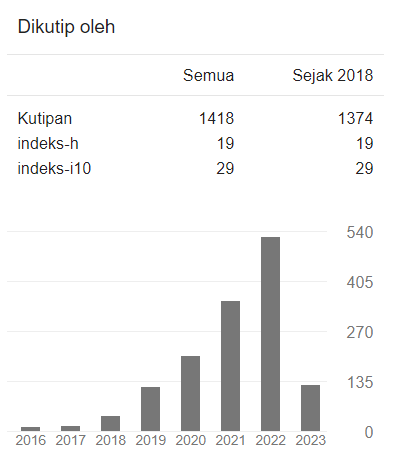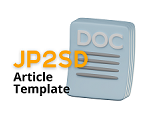Strategi Pembinaan Melalui Project Citizen dalam Rangka Penguatan Self Confidence dan Creative Skill Peserta Didik
DOI:
https://doi.org/10.22219/jp2sd.v12i1.32713Keywords:
Strategi, Project Citizen, Penguatan, Self Confidence, Creative SkillAbstract
Pancasila education in the independent curriculum is designed to build various personal and interpersonal student competencies. Learning must provide students with a challenging, fun, and meaningful learning experience. The selection of learning models based on the subject matter students learn is essential. With a qualitative approach, this research was carried out at SDN Sambi 1 Ringinrejo District to strengthen students' self-confidence and creative skills. This research was carried out with the research subjects of grade 5 students. The informants of this study were the principal, teacher and 6 learners. This is because, based on information from teachers, these students tend to be less active in learning and shy about conveying their ideas or ideas. Data were collected through observation, interviews and documentation and analyzed using a four-step process: data reduction, analysis, presentation, and conclusions. The results of this study show that the right strategy to strengthen self-confidence and creative skills is to apply the project citizen learning model, whose learning steps include identifying problems that exist in society, selecting problems as the focus of class studies, collecting information from various resource persons, portfolio development, and reflection. The results showed a correlation between applying the project citizen learning model and strengthening students' self-confidence and creative skills. Collecting information, group discussions, and preparing portfolios foster students' creative skills to create and solve problems that arise in everyday life, especially those related to the application of Pancasila values that occur in society.
Downloads
References
Adha, M. M., Yanzi, H., & Nurmalisa, Y. (2018). The Improvement of Student Intelectual and Participatory Skill Through Project Citizen Model in Civic Education Classroom. International Journal Pedagogy of Social Studies, 13.
Alias, J., Mohamed, N. S. S., Ishak, M., Zhou, X., & Thompson, G. E. (2018). The Influence of Hot Forming on the Microstructure and Corrosion Behaviour of AZ31B Magnesium Alloys. Indonesian Journal of Science and Technology, 3(2), 150. https://doi.org/10.17509/ijost.v3i2.12758
Aminu, I., Hadiza, B., Murtala, Y., Kamaluddeen, B., Salisu Maiwada, A., Jamila Mashi, A., & Abba, B. (2018). Nigerian Citrullus Lanatus Fruit and Seed Juice Reduces Cardiovascular Diseases Modifiable Risk Biomarkers in Normal Experimental Rats. Journal of Hypertension and Management, 4(2). https://doi.org/10.23937/2474-3690/1510036
Amirudin, A., Dewi, A. K., Solaahuddin, I., Tamalia, I., & Andira, S. M. (2019). Penerapan Metode Project Citizen dalam Pembelajaran Pendidikan Kewarganegaraan untuk Meningkatkan Kreativitas Peserta didik. Jurnal Rontal Keilmuan PKn, 11.
Azevedo, I., Fátima Morais, M., & Martins, F. (2019). The Future Problem Solving Program International: An Intervention to Promote Creative Skills in Portuguese Adolescents. The Journal of Creative Behavior, 53(3), 263–273. https://doi.org/10.1002/jocb.175
Dharma, S., & Siregar, R. (2020). Membangun Pengalaman Belajar Kewarganegaraan melalui Model Pembelajaran Project citizen pada Peserta didik. JUPIIS: Jurnal Pendidikan Ilmu-Ilmu Sosial, 7(1), 100. https://doi.org/10.24114/jupiis.v7i1.2303
Fajri, I., Yusuf, R., & Yusoff, M. Z. M. (2021). Model Pembelajaran Project Citizen Sebagai Inovasi Pembelajaran Dalam Meningkatkan Keterampilan Abad 21. 2(3).
Faridli, E. M. (2021). Pengaruh Model Project Citizen Dalam Pembelajaran Pendidikan Kewarganegaraan Terhadap Penanaman Nilai-Nilai Anti Korupsi Peserta didik Sma Pada Konsep Sistem Hukum Dan Peradilan Nasional. Jurnal Khazanah Pendidikan, 20. https://doi.org/10.30595/jkp.v3i2.645
Fauziah, D. N. (2017). Penerapan Model Mind Map Untuk Meningkatkan Kreativitas Dan Pemahaman Peserta didik Pada Materi Sejarah Kerajaan Islam Di Indonesia. Mimbar Sekolah Dasar, 4.
Ginting, M. A. B. (2023). Model Project Citizen Untuk Meningkatkan Kompetensi Kewarganegaraan Peserta didik Sekolah Dasar (Literature Review). LPPM Ummat, 2.
Gumelar, A., Bunyamin, M., & Kaham, K. (2023). Penerapan Pembelajaran Pendidikan Kewarganegaraan Berbasis Project Citizen untuk Penguatan Karakter Gotong Royong. Jurnal Moral Masyarakat. http://ejournal.unikama.ac.id/index.php/JMK
Handayani, M., Haryanto, & Wibowo, A. (2022). Project Citizen Model in Citizenship Education and Its Impact on Critical Thinking Skills for Elementary School Teacher Education Students. International Journal of Elementary Education, 6.
Harahap, N. (2020). Penelitian Kualitatif (Vol. 199). Wal ashri Publishing.
Hendriana, H., Sumarmo, U., Carli, C., Ristiana, M. G., & Putra, H. D. (2019). Enhancing students mathematical creative skill and resilience by using problem posing approach. Journal of Physics: Conference Series, 1318(1), 012065. https://doi.org/10.1088/1742-6596/1318/1/012065
Lauster. (2006). Tes Kepribadian. PT. Bumi Aksara.
Marzano, R. J., Pickering, D. J., & Pollock, J. E. (1988). Marzano, R.J. et al. 1988. Dimension of Thinking a Framework for Curriculum and Instruction. Virginia: . Assosiation for Supervisions and Curriculum Development (ASCD).
Miles,M.B., & Huberman, A.M. (2014). Qualitative Data Analysis: A Methods Sourcebook. Sage Publications.
Mukhlisotin, F. A. (2022). Pengaruh Model Pembelajaran Project Citizen terhadap Kemampuan Berpikir Kritis Peserta didik pada Mata Pelajaran Pendidikan Pancasila dan Kewarganegaraan. Jurnal Ilmiah Pendidikan Pancasila dan Kewarganegaraan, 7(1), 214. https://doi.org/10.17977/um019v7i1p214-227
Muzaki, A. N., Trisiana, A., & Putri, E. S. (2022). Pemahaman Model Project Citizen Bagi Peserta didik SMA/MA dalam Memperkokoh Identitas Nasional. Bhineka Tunggal Ika: Kajian Teori dan Praktik Pendidikan PKn, 9(1), 13–26. https://doi.org/10.36706/jbti.v9i1.16193
Oktradiksa, A., Bhakti, C. P., Kurniawan, S. J., Rahman, F. A., & Ani. (2021). Utilization artificial intelligence to improve creativity skills in society 5.0. Journal of Physics: Conference Series, 1760(1), 012032. https://doi.org/10.1088/1742-6596/1760/1/012032
Parawangsa, E., Dewi, D. A., & Furnamasari, Y. F. (2021). Hakikat Pendidikan Kewarganegaraan di Sekolah Dasar (SD). 5, 8050–8054.
Pratomo, L. C., Peserta didikndari, S., & Wardani, D. K. (2021). The Effectiveness of Design Thinking in Improving Student Creativity Skills and Entrepreneurial Alertness. International Journal of Instruction, 14(4), 695–712. https://doi.org/10.29333/iji.2021.14440a
Putri, F. A., Dewi, D. A., & Furnamasari, Y. F. (2021). Implementasi Pembelajaran PKn Sebagai Pembentukan Karakter Peserta Didik Sekolah Dasar. 5, 7362–7368.
Rafiah, H., & Huriaty, D. (2021). Creativity of Elementary School Students Based on The Description Text Writing Skill. http://ejournal.umm.ac.id/index.php/jp2sd
Rizzi, V., Pigeon, C., Rony, F., & Fort-Talabard, A. (2020). Designing a creative storytelling workshop to build self-confidence and trust among adolescents. Thinking Skills and Creativity, 38, 100704. https://doi.org/10.1016/j.tsc.2020.100704
Sidiq, D. U., Ag, M., & Choiri, D. M. M. (2019). Metode Penelitian KUualitatif di Bidang Pendidikan. CV. Nata Karya.
Sofia, & Gyurova, V. (2020). The place of research and creative skills in the training of future teachers. Education & Self Development, 15(3), 120–129. https://doi.org/10.26907/esd15.3.11
Suarim, B., & Neviyarni. (2021). Hakikat Belajar Konsep pada Peserta Didik. Edukatif : Jurnal Ilmu Pendidikan, 3(1), 75–83. https://doi.org/10.31004/edukatif.v3i1.214
Sulaiman, & Nurmasyitah. (2020). Model Project Citizent dalam Meningkatkan Kecakapan Pendidikan Kewarganegaraan pada Pengembangan Nilai Nilai Karakter Budaya Bangsa. Junal Pesona Dasar Universitas Syiah Kuala, 11, hal. 59-70.
Wekke, I. (2019). Metode Penelitian Sosial. CV. Adi Karya Mandiri.
Yolawati, N. N., Hartantri, S. D., & Budiatman, I. (2022). Analisis Model Pembelajaran Project Citizen pada Mata Pelajaran PKn Materi Kewajiban Menjaga Lingkungan Peserta didik Kelas IV SDN Neglasari 1 Kota Tangerang. Jurnal Pendidikan dan Konseling.
Downloads
Published
Issue
Section
License
Copyright (c) 2024 Rahadian Sofianto, Sri Untari, Shirly Rizky Kusumaningrum

This work is licensed under a Creative Commons Attribution-ShareAlike 4.0 International License.
Authors who publish with Jurnal Pemikiran dan Pengembangan Sekolah Dasar (JP2SD) agree to the following terms:
- For all articles published in Jurnal Pemikiran dan Pengembangan Sekolah Dasar (JP2SD), copyright is retained by the authors. Authors give permission to the publisher to announce the work with conditions. When the manuscript is accepted for publication, the authors agree to automatic transfer of the publishing right to the publisher.
- Authors retain copyright and grant the journal right of first publication with the work simultaneously licensed under a Creative Commons Attribution-ShareAlike 4.0 International License that allows others to share the work with an acknowledgment of the work's authorship and initial publication in this journal.
- Authors are able to enter into separate, additional contractual arrangements for the non-exclusive distribution of the journal's published version of the work (e.g., post it to an institutional repository or publish it in a book), with an acknowledgment of its initial publication in this journal.
- Authors are permitted and encouraged to post their work online (e.g., in institutional repositories or on their website) prior to and during the submission process, as it can lead to productive exchanges, as well as earlier and greater citation of published work (See The Effect of Open Access).

This work is licensed under a Creative Commons Attribution-ShareAlike 4.0 International License.


















